Company History
The City of Ljubljana cemeteries and the ŽALE company have a long-established tradition and a rich history, which attests to the importance of cemetery and funeral services. Read about the changes and developments that took place throughout their history.
2020
The prayer hall and St Nicholas’ Chapel of Rest were renovated. The company approved the sale of EDINA candles – eco-friendly grave candles, which are made of recycled waste cooking oil, feature a glass casing that can be returned and refilled, and are thus zero-waste. The candles are available exclusively in the Plečnikova cvetličarna florist shop at the Žale cemetery and in two online shops, namely www.plecnikova-cvetlicarna.si and an online shop by the BOLJE social enterprise. Based on internationally recognised criteria, the BISNODE credit-rating agency awarded the Žale company the AAA Platinum Creditworthiness Certificate of Excellence. The Platinum certificate is awarded only to select companies that fulfil the highest Golden AAA Creditworthiness criteria for three years in a row.
2019
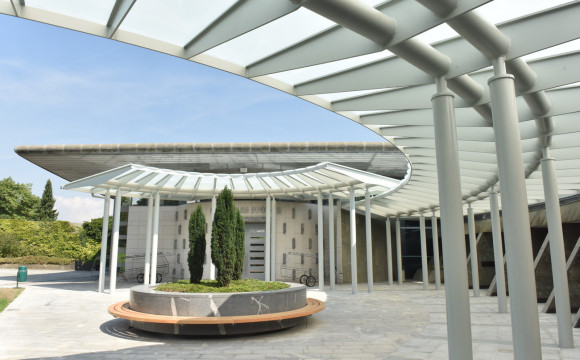
The Polje cemetery was extended – a new funeral visitation hall was added, as was a branch of the Plečnikove cvetličarne florist shop, 1,500 new burial plots (traditional, ground and columbarium graves) and an ash-scattering park area. A new projecting roof was built in front of chapels of rest and the funeral visitation hall at the New Žale to provide funereal attendees with protection against the elements (rain, snow, sun). The first five chapels of rest at Plečnik's Žale (St. Peter's, St. Jacob's, St. Mary's, St. John's, St. Ahac’s were restored. The company participated in the creation and sale of Slovenia's first biodegradable candle – the Everegreen candle. By signing the commitment and receiving the certificate, the company joined the first 30 organisations of the Chamber of Municipal Economy at the Chamber of Commerce and Industry of Slovenia whose environmental care is demonstrated by obtaining a certificate to promote potable tap water – our most valuable natural resource – and thus contribute to waste minimisation, as well as health and environment protection.
2018
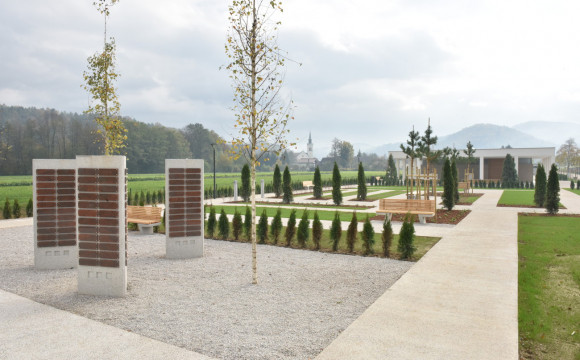
The Ministry of Defence of the Republic of Slovenia awarded the Žale company a Grand Plaque for Cooperation in recognition of its exceptional sacrifices, efforts and contribution to the reinforcement and success of the Slovenian Armed Forces and the Ministry of Defence. The Sostro cemetery was extended – a new funeral visitation hall was added, as were more than 700 burial plots (traditional, ground and columbarium graves) and an ash-scattering park area. The company also received a special acknowledgement from the Ekvilib Institute for spreading the family-friendly-enterprise culture, by means of which the company contributes to their employees' work-life balance. The extension of Plečnik's carpentry workshops was renovated.
2017
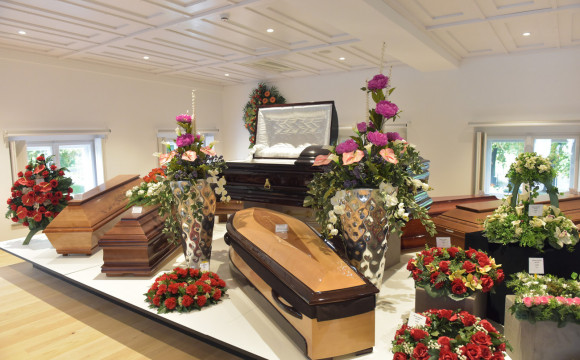
The left propylaeum section at Plečnik's Žale cemetery was renovated. The ground floor now houses the renovated offices, where funeral service arrangements can be made, and the entire upper floor serves as the largest exhibition space for funeral equipment in Slovenia. The online and mobile versions of the find-a-grave search tool were upgraded to feature grave photos, which made it even easier for users to identify a grave. A virtual 3D Space Fly-Through was included on the Žale Cemetery's website and YouTube channel. Free Wi-Fi was provided for visitors on the Žale cemetery grounds. In cooperation with the Association of Significant Cemeteries in Europe (ASCE), and Pogrebno podjetje Maribor (Maribor Funeral Services), the company organised an international symposium titled Digital Technology in Cemeteries and demonstrated a new virtual reality option that allows touring Plečnik's Žale – All Saints’ Garden by means of a VR headset. This service is also available on the company’s website. Free transport around the Žale Cemetery with the Kavalir electric vehicle was launched – it is available on Sundays and public holidays from April to October.
The Supervisory Board confirmed a new five-year term for the company's Managing Director, Robert Martinčič, MSc.
2016
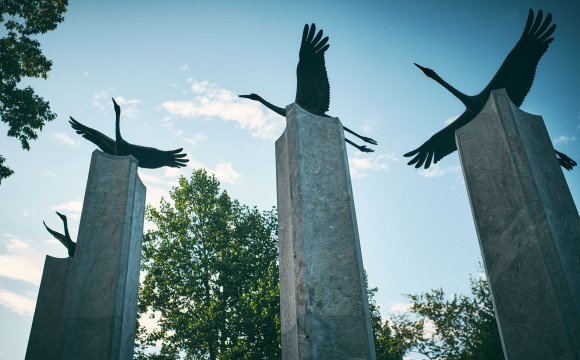
The company ŽALE, d.o.o. was the finalist for the Republic of Slovenia's award for business excellence and received a diploma. It was also the recipient of the international certificate ‘Recognised for Excellence – 4 Star’. The website of the Plečnikova cvetličarna florist shop was launched. The horse-drawn carriage funeral option was added to the range of available services. The company participated in the erection of a Monument to the Sons of Russia and the Soviet Union who had died on Slovenian soil during the First and Second World Wars. On Data Privacy Day, the company received a recognition award presented by the Information Commissioner of the Republic of Slovenia for having obtained a certificate according to the standard for the information security management system ISO/IEC 27001:2005 and its other efforts to protect personal data.
2015
The Chamber of Commerce and Industry of Slovenia – the Chamber of the Central Slovenian Region presented the Žale company with a bronze award for its innovative find-a-grave search tool. Several features were added to the existing options for the visualisation of cemeteries within the City of Ljubljana (i.e. virtual cemetery tours and cemetery exploration), namely a virtual map of the Žale cemetery, 100 information points and a virtual tour of the chapels of rest’s interior at Plečnik's Žale. The company was the first funeral service provider in Slovenia to include a new funeral service dubbed the White Flame in its range of services and products, actively participating in its development throughout the year. An interactive map of bus routes provided by the Ljubljana public bus service (LPP) was added to the website. Also, the company received the certificate of conformity to the information security management standard (ISO/IEC 27001) and the full family-friendly company certificate. Žale was awarded the highest credit worthiness certificate AAA – Gold Excellence by the BISNOD credit-rating agency. The company also submitted its application to qualify for the Republic of Slovenia's business excellence award. Plečnik's carpentry workshops were renovated.
2014
Žale was the first company in Slovenia to set up a mobile version of the find-a-grave search tool which guides users to graves; the web search-tool version was upgraded to allow the mapped-out grave routes to be marked and printed out. The ARtour mobile guide was upgraded with three new theme-based search parameters: Writers and Poets, Actors and War Cemeteries. The company was also the first in Slovenia to create a mobile and web app of the PIS ŽALE information system, which provides a virtual overview of all relevant data related to cemetery management.
The year 2014 marked the Žale company's 100th anniversary. On this special occasion, the Chamber of Municipal Economy at the Chamber of Commerce and Industry of Slovenia presented the company with its ZKG-GZS Award for 100 years of successful operation. At a special ceremonial event, the City of Ljubljana awarded the Žale company a special charter for a hundred years of company activities benefitting the citizens and the company's efforts to preserve cultural heritage. To honour its 100th anniversary, the company published a book titled ‘100 Years of the Žale Company’.
2013
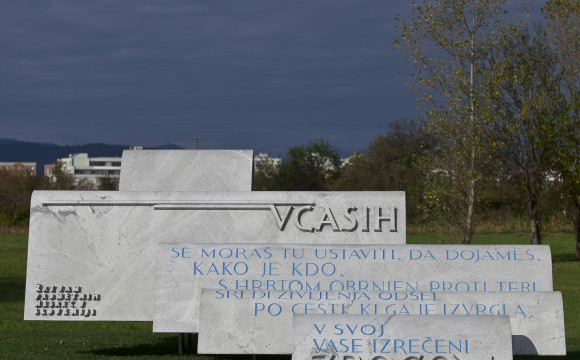
Support processes (related to finance & accounting, HR, public procurement and IT) were transferred to Javni Holding Ljubljana, d.o.o. and the SAP information system was introduced. To mark the Heritage Days of European Cemeteries, visitors to the Žale Cemetery were offered two free mobile ARtour guides: the mobile guide ‘Plečnik’s Žale – All Saints’ Garden’ and the mobile guide ‘Park of Peace – Žale Cemetery‘. The company launched the first regular guided tours of cemetery-related cultural heritage in Slovenia. The company was involved in the erection of Slovenia's first and central Monument to the Victims of Traffic Accidents.
2012
Robert Martinčič, Msc, became the new General Manager of the company ŽALE Javno podjetje, d.o.o. The company was awarded the basic ‘family-friendly company’ certificate.
2011
The classic part of the Žale cemetery was expanded (section D) according to the designs by architect Marko Mušič.
2010
The ŽALE stonemason’s workshop opened in the western part of the commercial pavilion at Plečnik’s Žale, as did the PST florist shop at Kerševan’s Žale. A mobile website was set up.
2009
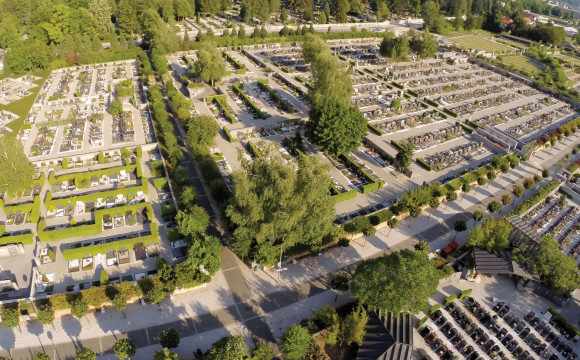
The company was entrusted with the management of eight more cemeteries, namely Črnuče, Šentjakob, Šmartno pod Šmarno goro, Janče, Prežganje, Javor, Mali Lipoglav and Šentpavel. The expansion of the urn burial area of the Žale Cemetery (‘section D’), designed by architect Marko Mušič, was underway. Plečnik’s Žale complex was proclaimed a cultural monument of national importance.
2008
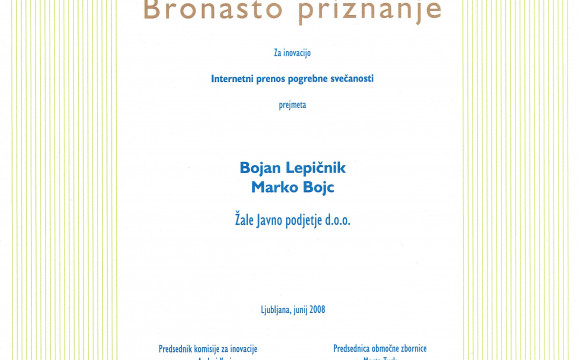
The company was awarded a bronze medal of the Chamber of Commerce and Industry of Slovenia – Ljubljana Regional Unit for its innovative online live streaming of funerals. The company was also the first in Slovenia to start publishing the times of scheduled funerals and obituaries on its website.
2007
The company was awarded the certificate of conformity to OHSAS 18001:2007, the international occupational health and safety standard. It was also the world's first funeral company to offer online live streaming of funerals. A find-a-grave search tool was added to the website as the first feature of its kind in Slovenia – it can be used to find a grave and map a route to the cemetery section in question. The European Heritage Board composed of ministers of culture and heritage from EU member states awarded Plečnik’s Žale complex with the European Heritage Label based on an intergovernmental initiative.
2006
The company was awarded the certificate of conformity to the ISO 14001:2004 international environmental protection standard. In October 2006, free electric vehicle rides were made available to Žale cemetery visitors.
2005
A fourth cremation furnace with an exhaust-gas cooling system was added. The company was the first company in Slovenia to start using an electric vehicle to transport the deceased and people with reduced mobility during funerals. Slovenia's first two interactive cemetery touchscreens were set up at the Žale Cemetery to display information, as was a candle vending machine. The company started managing its cemeteries by means of the PIS ŽALE information system (and was the first company in Slovenia to do so), which allowed a virtual overview of all relevant data.
The Žale company was also the first company in the world to offer a virtual cemetery tour of the Žale cemetery's and its cultural heritage on its website and the touchscreens. A 360° view allowed viewers to see the key points of the cemetery, including the graves of important personalities, war graves and Plečnik's Žale. The visualisation of Plečnik's Žale Cemetery was a subchapter of the virtual museum ‘Ljubljana as an Open-Air Museum – City View’, set up in 1993 and one of the first online virtual museums.
2004
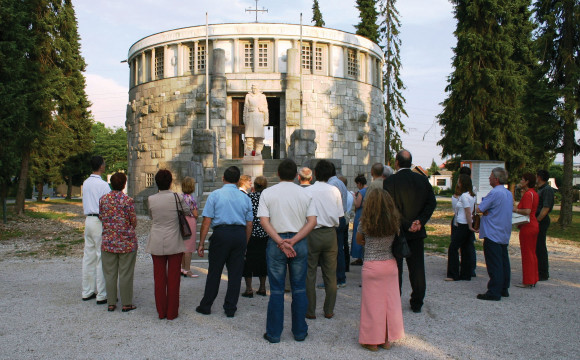
The first Heritage Days of European Cemeteries were organised in Slovenia under the auspices of the Association of Significant Cemeteries in Europe (ASCE), as were the first free guided tours of the cultural heritage of cemeteries. The first charity stand was organised on All Saints' Day.
2003
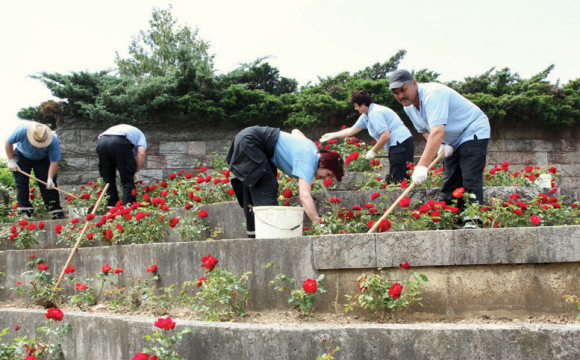
Bojan Lepičnik became the new General Manager at the helm of the company ŽALE, d.o.o. A renovated funeral visitation hall was inaugurated at Kerševan’s Žale, allowing mourners to be present at the cremation of the deceased.
2002
The Žale Cemetery became part of the European Cemeteries Route (ECR).
2001
The so-called Snowdrop Park opened, the first cemetery area of its kind in Slovenia intended for the burial of deceased and stillborn babies, as did a new commercial pavilion at Plečnik’s Žale, which houses the Plečnikova cvetličarna florist shop. A third cremation furnace became operational. The company became an active member of the Association of Significant Cemeteries in Europe (ASCE), one of whose founding member is City of Ljubljana.
2000
The company was awarded the certificate of conformity to the ISO 9001:2015 (at the time ISO 9002) quality standard.
1994
The company’s professional services were moved to the renovated premises at Plečnik’s Žale.
1992
On 11 February, funeral services recommenced at the renovated Plečnik’s Žale Cemetery.
1990
The Žale company was transformed into ŽALE Javno podjetje, d.o.o. (ŽALE Public Company, plc).
1988
The construction of a new section of the Žale Cemetery (‘section D’) based on the designs of architect Marko Mušič commenced and were completed in 1989. This section also featured the Remembrance Grove as the first place in Slovenia where cremated ashes could be scattered.
1982
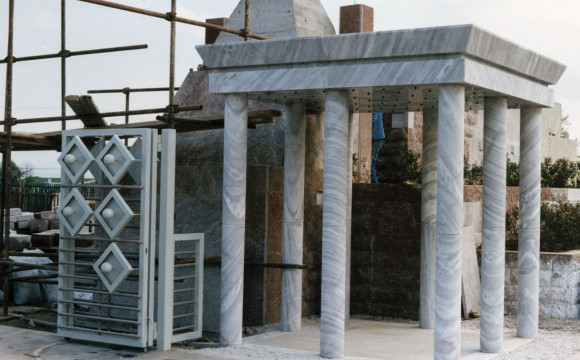
Architect Marko Mušič designed a new part of Žale.
1979
The headquarters of TOZD Žale were officially moved to a new building on Tomačevska Road.
1978
The crematorium of Ljubljana, the first and, at the time, the only one in Slovenia, equipped with two TABO furnaces, became fully operational on 26 December.
1975
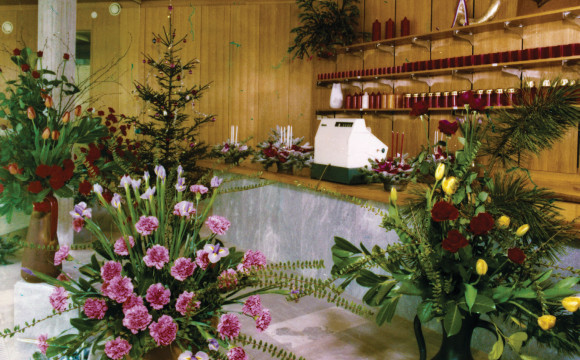
Activities and preparations for the construction of a crematorium in Ljubljana were underway. The City’s council appointed a self-initiative board for the construction of the crematorium, and a construction board, thus designating the Ljubljana Public Utility Company or TOZD Žale as the investor in the crematorium, the funeral visitation halls and the administration offices to be built alongside Tomačevska Road.
1974
The Žale company was transformed into Žale Public Utility Company, Ljubljana.
1973
The Žale company became a member of the European Burial Union (EBU) and was in regular contact with other European funeral service providers.
1969
The company started managing the cemeteries in Polje and Sostro.
1963
The Žale Funeral Institute was renamed ‘Municipal Public Utility Company Funeral Institute Žale, Ljubljana’, a newly established company. In addition to the central Žale Cemetery, the company started managing the cemeteries in Bizovik, Dravlje, Rudnik, Stožice, Šentvid, Štepanja vas and Vič, while also providing partial funeral service at the Črnuče Cemetery.
1961
The Žale Funeral Institute was tasked with the management and upkeep of the Šentvid cemetery.
1956
The Žale Funeral Institute was designated as the manager of the Bizovik cemetery.
1954
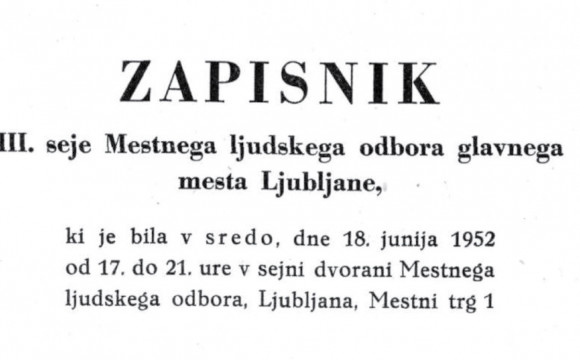
The Žale establishment was proclaimed a financially independent undertaking named the Žale Funeral Institute on 7 April.
1952
Following reorganisation of the Municipal People’s Committee (MLO) and cessation of district people’s committees, the Žale company was also entrusted with the management of the cemeteries in Dravlje, Rudnik, Stožice, Šentvid, Štepanja vas and Vič. Based on the MLO's decision, the National Company Žale was proclaimed an economic institution with independent funding on 18 July.
1947
The Central Cemetery of Ljubljana was annexed to the Žale company on 1 July 1947.
1946
Based on a decision of the Municipal People’s Committee (MLO), the so-called National Company Žale was established on 23 October and was proclaimed an economic institution with independent funding. The MPO took over the entire Žale Cemetery, which had previously been managed by the diocesan ordinariate.
1940
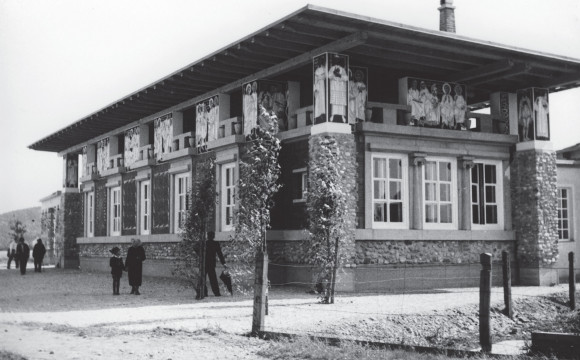
The inauguration of what is today Plečnik's Žale took place on 7 July.
1938
Following a lengthy debate, on 13 October, the Municipal Council adopted the name Žale – roughly translated as a ‘place of mourning’ – for the new mortuary complex with several chapels of rest. The mortuary and the chapels were constructed over a span of two years.
1936
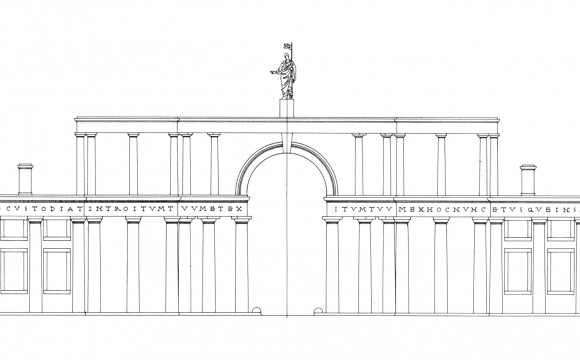
The Municipal Council made the decision to build chapels of rest and stipulated that placing the deceased there would be compulsory. The first chapel-of-rest designs were created by the architect Spinčič, however, in early 1936, the new management board of the Municipal Funeral Institute decided not to use his designs because the construction would be too costly, instead asking architect Plečnik to design a construction programme and chapel-of-rest plans.
1929
The Municipal Funeral Institute addressed the pressing issue of chapel-of-rest construction, because at the time the deceased still awaited burial in their homes. The management board suggested building a mortuary at the cemetery next to the Holy Cross Church.
1927
The municipality bought a house and a plot of land in the Ambrož Square to be used by the institute. Later that same year, the institute purchased funeral equipment from two other private undertakers.
1924
The institute bought a plot of land on Akacijeva (the present-day Njegoševa) Street in Ljubljana, intending to use it to build the premises for the business needs of the institute and a morgue.
1923
The cemetery was owned by the parishes of Ljubljana, which leased out the cemetery to a leaseholder, who was free to choose hired hands to dig graves, take care of the cemetery upkeep, and outsource various services to private providers. The parishes of Ljubljana also established a cemetery fund in charge of which was the diocesan ordinariate, which appointed its legate, who – aided by his employees – managed the cemetery next to the Holy Cross Church.
1921
In 1921, the Municipal Council granted a permit to the Funeral Institute to build its own business premises.
1915
On 12 October, the Municipal Council adopted the Institute's rules with the aim of carrying out the concession granted through a tender of the Provincial Government, and managed collectively all of the former private companies purchased by the Municipality. In accordance with the rules, the management of the company was composed of the Municipal Council of Ljubljana, the company’s management board and the managing director. The Municipal Council drew up the rules, ceremonials, funeral pricing and appointed the management board and the director.
1914
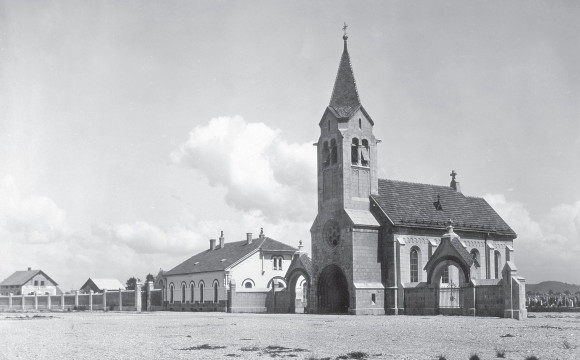
On 1 August 1914, the Municipal Funeral Institute commenced its activities as an enterprise. Prior to that, on 24 June, the Municipality signed its first purchase agreement with a privately owned funeral company Doberbe, acquiring all the funeral equipment stored in warehouses, garages and stables on Frančiškanska (today’s Nazorjeva) Street and its offices on Prečna Street.
1913
Following a trade order, on 13 June 1913, the Municipal Council of Ljubljana submitted an application to the Provincial Government of Carniola, requesting to be granted a concession that would allow the municipality to provide funeral services. On 15 July 1913, the Municipal Council thus decided to establish a municipal funeral institute, which was to purchase the required funeral equipment from private Ljubljana-based undertakers. It took until 27 October 1913 for the Provincial Government of Carniola to finally grant the funeral service concession to the City of Ljubljana.
1907
The Austrian Trade Act gave priority rights to granting and obtaining funeral service concessions to the citizens.
1906
The year 1906 marked the first official funerals in the new cemetery next to the Holy Cross Church.
1904
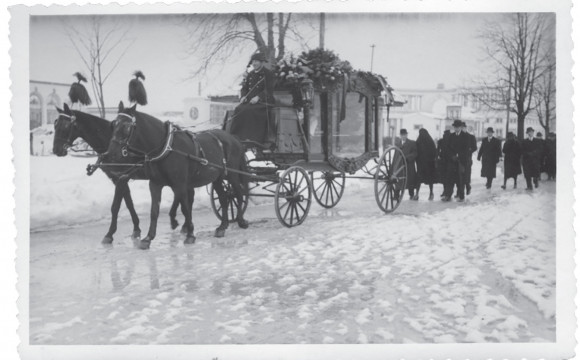
The first burial took place in the new cemetery in 1904.
Before 1900, Ljubljana only had private funeral businesses (undertakers) that provided all types of funeral services and transportation of the deceased, based on special permits issued by the provincial government.
Cemetery and funeral services are without doubt among the oldest services in any society.
Since time immemorial, in villages and hamlets, the deceased were buried with either opulent or modest ceremonies prepared by villagers themselves. In larger settlements and towns, special services were established to take care of cemeteries and the burial of the dead. In the beginning, cemetery-related activities and the upkeep of graveyards were in the hands of the church, while funeral activities were a private trade.








